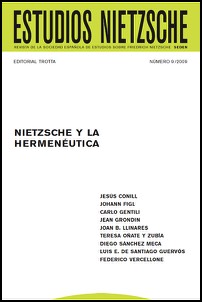La hermenéutica transcultural. La interpretación nietzscheana de las religiones y culturas extraeuropeas
DOI:
https://doi.org/10.24310/EstudiosNIETen.vi9.10309Abstract
En mi artículo quisiera explicar, en primer lugar, algunos ejemplos de los conocimientos tempranos de Nietzsche sobre culturas y religiones extraeuropeas y la metodología histórico-genealógica, estrechamente relacionada con ellas, para centrarme, en segundo lugar, en la «época de la comparación», como una de sus consecuencias. En tercer lugar presentaré sus consecuencias para la concepción del ser humano aplicada por Nietzsche, para analizar, en cuarto y último lugar, la relación entre la nueva hermenéutica filosófica y la transculturalidad de Nietzsche.
Downloads
Metrics
References
Bornmann, F., «Anekdota Nietzscheana aus dem philologischen Nachlaß der Basler Jahre (1869-1878)», en T. Borsche y otros (eds.), ‚Centauren-Geburten‘. Wissenschaft, Kunst und Philosophie beim jungen Nietzsche, Berlin: W. de Gruyter, 1994.
Campioni, G. y otros (eds.), Nietzsches persönliche Bibliothek, Berlin: W. de Gruyter, 2003.
Etter, A, «Nietzsche und das Gesetzbuch des Manu», Nietzsche-Studien 16 (1987), 340-352.
Figl, J. «Nietzsche’s Encounter with Buddhism» en B. Bäumer/J. R. Dupuche (Ed.), Void and Fullness in the Buddhist, Hindu and Christian Traditions. ??nya-P?rna- Plêroma. With a Concluding Speech by His Holiness the Dalai Lama, 2005.
Figl, J., Dialektik der Gewalt, Berlin: W. de Gruyter, 1984.
H. Bobzin, H., Mohammed, 2000. : «Vom ‚Pseudopropheten’ zum ‚Helden’: Abendländische Mohammedbilder».
Hardiyanto, S., Zwischen Phantasie und Wirklichkeit. Der Islam im Spiegel des deutschen Denkens im 19. Jahrhundert, 1992.
Koberstein, K. A. Grundriß der Geschichte der deutschen Nationalliteratur, 5ª edición, vol. 1, 1872, 13: «Genealogie der Gothen», así como la nota 4: «Genealogien der altsächsischen Stammsagen».
Müller, M., Einleitung in die vergleichende Religionswissenschaft, 2ª edición 1876, Vorrede III, cfr. pp. 95ss.
Nietzsche, F., Obras Completas, I-IV (OC ). Director ed. Diego Sánchez Meca. Madrid: Tecnos, 2011-2016
Nietzsche, F., Correspondencia I-VI. (CO). Director ed. Luis E. de Santiago Guervós. Madrid : Trotta, 2005- 2012.
Nietzsche, F., Fragmentos Póstumos I-IV (FP). Director ed. Diego Sánchez Meca. Madrid: Tecnos, 2006-2010.
Thatcher, D.S., «Nietzsche’s Debit to Lubbock», Journal of the History of Ideas 44 (1983), 293-309.
Welter, Th. B., Lehrbuch der Weltgeschichte, 1854 (BN = Biblioteca de Nietzsche).
Downloads
Published
How to Cite
Issue
Section
License
As of issue 21 (2021) this journal is published only in open access (diamond route).
From that number 21, like the previous numbers published in NIETZSCHE STUDIES, they are subject to the Creative Commons Acknowledgment-NoComercia-ShareIgual 4.0 license, the full text of which can be consulted at <http://creativecommons.org/licenses/by-nc-sa/4.0 >
It is the responsibility of the authors to obtain the necessary permissions of the images that are subject to copyright.
This work is licensed under a Creative Commons Attribution-NonCommercial-ShareAlike 4.0 International License.
Copyright generates two different rights: moral rights and patrimonial rights that EJFB recognizes and respects. Moral rights are those relating to the recognition of the authorship. They are rights of a personal nature that are perpetual, inalienable, unseizable and imprescriptible as consequence of the indivisible union of the author and his/her work.
Patrimonial rights are those that can be derived from the reproduction, distribution, adaptation or communication of the work, among others.







11.png)
